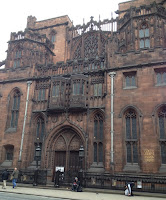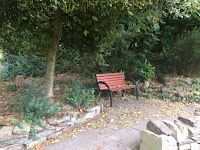They've been in
the news recently, mostly relating to closures or reduced funding, and this got
me thinking – how important are libraries? Are they still relevant in the
internet age when so many schools and homes are equipped with computers, and when
Wikipedia has all but replaced the encyclopedia? And when money is tight, should they still
be a priority for public funding?
Libraries have been a
feature of my life at every stage, and I’m lucky enough to have studied in some
of the most beautiful and historic libraries in the world. At Oxford University I was spoilt for choice between the famous university buildings such as The Bodleian, the faculty library (my favourite) or our college
library which was open all night (and we made good use of this, sometimes working through the night to finish an essay on time).
 |
| The Radcliffe Camera, Oxford |
But it was as a child
that the library had the most impact on me. My parents, like most people, were careful with money, and there wasn't much spare for books unless I was lucky enough to receive a gift voucher
for my birthday or Christmas. So, for a voracious reader like me, the library
was essential. It gave me the chance to experiment and explore different
authors and genres: fairy tales and adventure stories, pink hardback romance
novels, horrors (that phase didn’t last long), thrillers (that one lasted all
through my teens), to name but a few.
Without my local
library, I wouldn’t have had the varied grounding that later funnelled me
towards the realisation that the books I enjoyed the most were all romantic in
essence. I wouldn’t have developed a love of words, the feeling that there was
a whole other world between the pages of a novel in which ideas could be
explored, other cultures brought to life, and in which I could lose myself.
"If you do not value libraries then you do not value information or culture or wisdom." Neil Gaiman
I learned so much from
libraries, and not just in the non-fiction section. Fiction too
teaches us – about bygone events, about different people’s perspectives and
predicaments, about humanity. What better way to learn empathy than to put
yourself in the shoes of a character for 400 pages?
"Books help us understand who we are and how we are to behave." Anne Lamott (Bird by Bird)
My local library has changed
dramatically in recent times. It runs sessions for babies and
toddlers, it has a soft play area with sofas where parents read to their
children, a book group, a craft group, a writing group. It has computers and machines which clock my books in and out, meaning I don’t have as much reason to
chat to the librarians any more – which is a shame. On the other hand, it’s
easier to renew my books online.
 |
| John Rylands Library, Manchester |
But some things haven’t
changed. Remember the smell as you walked in, of dusty books and polished wood?
The sacred hush of dozens of people working or reading in silence? The
weight of a book in your hands as you read the blurb and decided if it was
worth a try or not. As a child I used to find it hard to whittle the choice
down to ten books, the maximum allowed on a ticket. I would carry those books
home like treasure, impatient to start devouring them. And then three weeks later I'd go back for more.
Now, as I walk into a library and run my gaze over
the shelves, I still get the same breathless feeling of excitement. So many books to read,
so little time!
How about you? Do you use a library? What does it mean to you?
Sophie.x



















